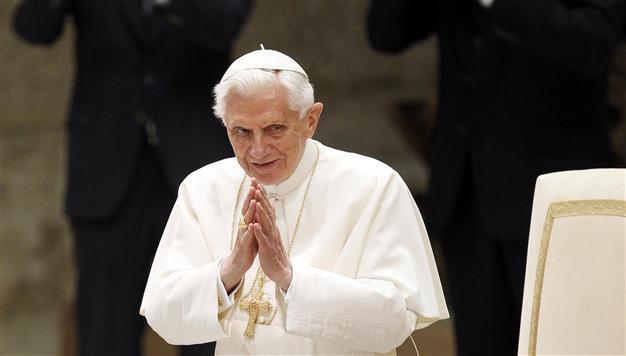Pope's third book on Jesus reaffirms virgin birth
VATICAN CITY - Reuters

Pope Benedict XVI. REUTERS Photo
Pope Benedict published the last part of his trilogy on the life of Jesus today, delivering an early childhood narrative which strongly reaffirms the doctrine of the virgin birth as an "unequivocal" truth of faith.
The book, 137 pages in its English version, is titled "The Infancy Narratives - Jesus of Nazareth" and is being published simultaneously around the world in 21 languages. It is bound to be another international bestseller like the previous volumes.
Divided into a forward, four chapters and an epilogue, it traces and analyses the gospel narratives from the birth of Jesus to his presentation in the temple at the age of 12.
The previous two volumes dealt with the adult life of Jesus and his public ministry.
One section of the book is called "Virgin Birth - Myth or Historical Truth?"
The Church teaches that Jesus was the son of God and was not conceived through sexual intercourse but by the power of the Holy Spirit, one part of the divine trinity.
In simple language that is at once academic but still easily accessible to a non-specialist readership, Benedict says the story of the virgin birth is not just a reworking of earlier Greek or Egyptian legends and archetypal concepts but something totally new in history.
"It is God's creative word alone that brings about something new. Jesus, born of Mary is fully man and fully God, without confusion and without separation..." he writes.
"The accounts of Matthew and Luke are not myths taken a stage further. They are firmly rooted, in terms of their basic conception, in the biblical tradition of God the Creator and Redeemer," he writes.
"Is what we profess in the Creed (a Christian prayer that includes belief in the virgin birth) true? he asks. He answers: "The answer is an unequivocal yes".
Catholics should see belief in the virgin birth and the resurrection of Jesus from the dead as "cornerstones of faith" because they are undeniable signs of God's creative power.
"If God does not also have power over matter, then he simply is not God," Benedict writes. "But he does have this power, and through the conception and resurrection of Jesus Christ he has ushered in a new creation."
In other sections of the book Benedict discusses the genealogy of Jesus, the figure of St Joseph, the story of the wise men who the Bible says paid tribute to the infant Jesus in the manger in Bethlehem.
In his two previous volumes on the life of Jesus, Benedict condemned violence committed in God's name and personally exonerated Jews of responsibility for the death of Jesus.
